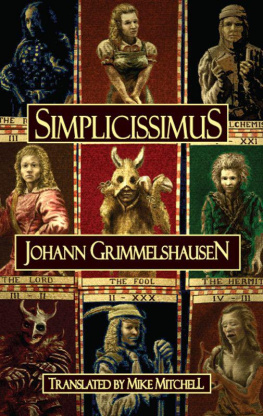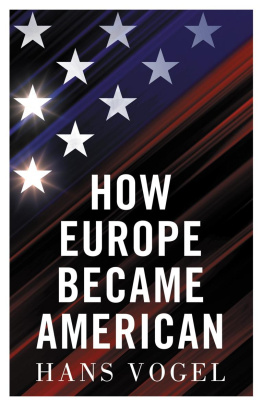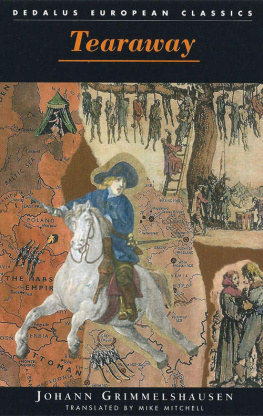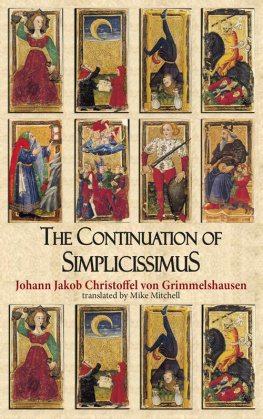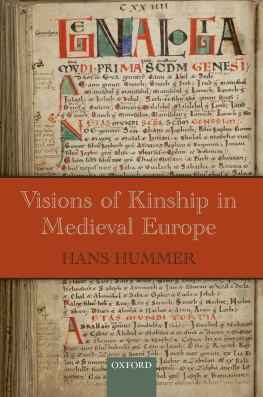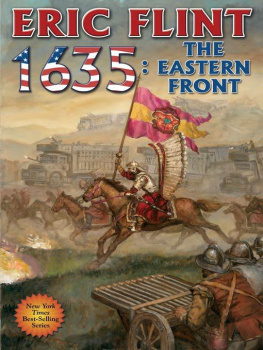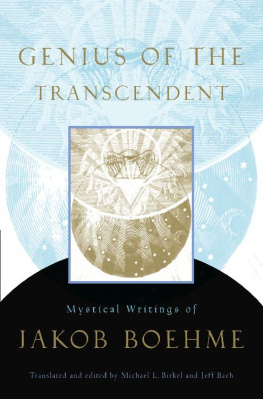Hans Jakob Christoffel von Grimmelshausen - Simplicissimus
Here you can read online Hans Jakob Christoffel von Grimmelshausen - Simplicissimus full text of the book (entire story) in english for free. Download pdf and epub, get meaning, cover and reviews about this ebook. year: 2014, publisher: Daedalus, genre: Art. Description of the work, (preface) as well as reviews are available. Best literature library LitArk.com created for fans of good reading and offers a wide selection of genres:
Romance novel
Science fiction
Adventure
Detective
Science
History
Home and family
Prose
Art
Politics
Computer
Non-fiction
Religion
Business
Children
Humor
Choose a favorite category and find really read worthwhile books. Enjoy immersion in the world of imagination, feel the emotions of the characters or learn something new for yourself, make an fascinating discovery.
- Book:Simplicissimus
- Author:
- Publisher:Daedalus
- Genre:
- Year:2014
- Rating:5 / 5
- Favourites:Add to favourites
- Your mark:
- 100
- 1
- 2
- 3
- 4
- 5
Simplicissimus: summary, description and annotation
We offer to read an annotation, description, summary or preface (depends on what the author of the book "Simplicissimus" wrote himself). If you haven't found the necessary information about the book — write in the comments, we will try to find it.
Simplicissimus — read online for free the complete book (whole text) full work
Below is the text of the book, divided by pages. System saving the place of the last page read, allows you to conveniently read the book "Simplicissimus" online for free, without having to search again every time where you left off. Put a bookmark, and you can go to the page where you finished reading at any time.
Font size:
Interval:
Bookmark:
Johann Jakob Christoffel von Grimmelshausen
Translated and with an introduction by Mike Mitchell

Published in the UK by Dedalus Limited
24-26, St Judiths Lane, Sawtry, Cambs, PE28 5XE
Email: info@dedalusbooks.com
www.dedalusbooks.com
ISBN 978 1 903517 42 0
Kindle e-book ISBN 978 1 907650 12 3
e-Pub e-book ISBN 978 1 907650 13 0
Dedalus is distributed in the USA and Canada by SCB Distributors,
15608 South New Century Drive, Gardena, California 90248
email: info@scbdistributors.com web site: www.scbdistributors.com
Dedalus is distributed in Australia by Peribo Pty Ltd,
58 Beaumont Road, Mount Kuring-gai N.S.W. 2080
email: peribo@bigpond.com
Publishing History
First published in Germany in 1668
English translation by S. Goodrich in 1912
Dedalus editions in 1989 and 1995
New translation by Mike Mitchell in 1999
Reprinted in 2005 and 2009
First e-book edition in 2010
The right of Mike Mitchell to be identified as the translator of this work has been asserted by him in accordance with the Copyright, Designs and Patents Act, 1988.
Printed in Finland by WS Bookwell
Typeset by RefineCatch Limited, Bungay, Suffolk
This book is sold subject to the condition that it shall not, by way of trade or otherwise, be lent, resold, hired out, or otherwise circulated without the publishers prior consent in any form of binding or cover other than that in which it is published and without a similar condition including this condition being imposed on the subsequent purchaser.
A C.I.P. listing for this book is available on request.
Mike Mitchell is one of Dedalus's editorial directors and is responsible for the Dedalus translation programme. His publications include The Dedalus Book of Austrian Fantasy , Peter Hacks: Drama for a Socialist Society and Austria in the World Bibliographical Series. His translation of Rosendorfer's Letters Back to Ancient China won the 1998 Schlegel-Tieck Translation Prize after having been shortlisted in previous years for his translations of Stephanie by Herbert Rosendorfer and The Golem by Gustav Meyrink. His translation of Simplicissimus was shortlisted for The Weidenfeld Translation Prize in 1999 and The Other Side by Alfred Kubin in 2000.
He has translated the following books for Dedalus from German: five novels by Gustav Meyrink, three novels by Johann Grimmelshausen, three novels by Herbert Rosendorfer, two novels by Herman Ungar, The Great Bagarozy by Helmut Krausser, The Road to Darkness by Paul Leppin, The Other Side by Alfred Kubin and On the Run by Martin Prinz. From French he has translated for Dedalus two novels by Mercedes Deambrosis and Bruges-la-Morte by Georges Rodenbach.
In these days (which some believe to be the last days) a new sickness has appeared among ordinary people. When those who have been infected by it have scratched together enough money with their sharp practices that they can afford, besides a few coppers in their purse, to dress themselves after the latest absurd fashion with thousands of silk ribbons, or when by some lucky chance they have made a name for themselves, they immediately try to pass themselves off as knights and nobles of ancient lineage. It usually turns out that their grandparents were day-labourers, carters and porters, their cousins muleteers, their brothers tipstaffs and turnkeys, their sisters whores, their mothers bawds, if not witches; in short that their whole ancestry, right down to the thirty-second degree, is as tainted and tarnished as ever Seb Sugars gang of thieves in Prague were. Indeed, these new-minted nobles are themselves often as black as if they had been born and bred in Guinea.
I wouldnt want to be likened to such foolish folk even though, to tell the truth, I have often fancied I must owe my existence to some great lord, or at least a gentleman, since I have a natural inclination to follow the noblemans trade, if only I had the necessary capital and equipment.
To be serious, though, it is true that my birth and upbringing can well be compared with that of a prince, if you overlook the one great difference. How can that be? you ask. My Da (for that is the title we give to fathers in the Spessart) had a palace of his own, as good as any mans, and finer than any king could build with his own hands. Its facade was finished off with clay and its roof, instead of sterile slate, cold lead and red copper, was covered with the straw on which the noble grain grows. And to make a show of his wealth and nobility, my Da did not, as other great lords do, build the wall round his castle out of stones, such as you may find by the roadside or dig out of the ground in barren places, much less out of common brick, which can be moulded and fired in a short time. No, he took oak, that noble and useful tree from which pork sausages and fat hams grow and which takes over a hundred years before it reaches full maturity. Where is the monarch who will follow him in that?
He had his rooms and chambers blackened all over inside with smoke, since that is the most permanent colour in the world and to paint them by that method takes longer than any artist would spend on even the best of his paintings. The wall-hangings were of the most delicate weave in the world, being made by the weaver who, in olden times, dared to challenge Minerva herself to a contest. The windows were dedicated to St Notoglas for the very good reason that he knew that, counting from the hemp or flax seed, the paper with which they were covered took much more time and labour before it was finished than the finest and clearest Murano glass. It was his station in life that led him to believe that things which required much labour to produce were therefore valuable and more costly, and that costly things were best suited to the nobility.
Instead of pages, lackeys and grooms, he had sheep, goats and pigs, each neatly clad in its own livery, which often used to wait upon me in the fields, until I drove them home. His armoury was well stocked with ploughs, hoes, axes, picks, spades and forks for both manure and hay. He practised daily with these weapons; clearing the ground and digging were for him a military exercise, just as they were for the ancient Romans in times of peace. The oxen were the company he commanded, spreading manure was his fortification and ploughing his campaigning, but mucking out the stables was his noble pastime, his jousting. By these means he dominated the whole round world, as far as he could walk, and at every harvest he gathered in rich tribute from it.
All this means nothing to me and I dont give myself airs because of it, so that no one will have reason to scoff at me along with other would-be nobles from the same background. I consider myself no better than my Da was, whose house was in a merry part of the country, namely over the hills and far away in the Spessart. The fact that I have refrained from going on at great length about my Das lineage, race and name is for the sake of brevity. This is not an application for entry to an abbey reserved to the nobility, in which case I would have to swear to my ancestry; it is sufficient for our purposes that you know that I come from the Spessart.
Since, however, it has been made clear that my Das household was truly noble, any intelligent person will readily conclude that I enjoyed a corresponding upbringing. And anyone who believes that will not be deceived, for by the age of ten I had already grasped the principles of my Das aforementioned noble exercises. However as far as learning was concerned I matched the famous Amphisteides, of whom Suidas reported that he could not count beyond five. The reason was perhaps that my Da, in his high-mindedness, followed the custom of the present age in which people of quality do not bother much with study, or tomfoolery as they call it, because they have other people to do their scribbling for them. But I was an excellent musician on the bagpipes, on which I could play the most beautiful dirges. In religion, however, I do not believe there was another boy of my age in the whole of Christendom who was like me, for I knew nothing of either God or man, heaven or hell, angels or the devil and could not tell the difference between good and evil. As you can well imagine, with such knowledge of theology I lived like our first parents in paradise, who in their innocence knew nothing of illness, death and dying, and even less of the resurrection. What a fine life (though you may say fools life) where you didnt have to bother with medicine! In the same way you can judge my knowledge of law and all other arts and sciences. Indeed, so perfect and complete was my ignorance that it was impossible for me to know that I knew nothing. I repeat: what a fine life it was that I led in those far-off days. But my Da did not want me to enjoy this bliss any longer. He thought it right and proper that, being nobly born, I should live and act according to my nobility, for which reason he began to educate me for higher things and give me harder lessons.
Next pageFont size:
Interval:
Bookmark:
Similar books «Simplicissimus»
Look at similar books to Simplicissimus. We have selected literature similar in name and meaning in the hope of providing readers with more options to find new, interesting, not yet read works.
Discussion, reviews of the book Simplicissimus and just readers' own opinions. Leave your comments, write what you think about the work, its meaning or the main characters. Specify what exactly you liked and what you didn't like, and why you think so.

